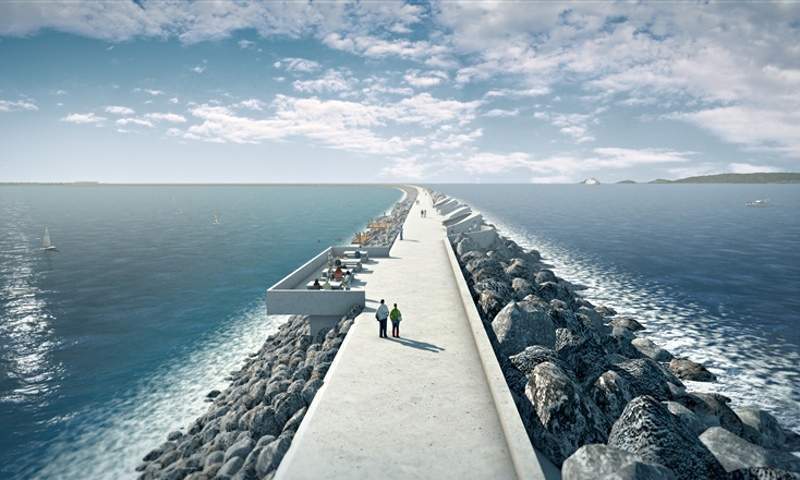
Plans to build the Swansea tidal lagoon, the world’s first project of its kind, have been scrapped by the UK Government after it was decided that the £1.3bn development was not cost-effective.
Construction of the lagoon power plant was scheduled to begin later this year in Swansea, South Wales. The project was intended to be a pathfinder, paving the way for similar initiatives and making the UK a world-leader in tidal power.
However, with renewable energy spending at its lowest since 2008, is the UK Government doing enough to support green projects?
Swansea tidal lagoon would have made the UK a world-leader in tidal energy
Tidal energy works by harnessing both the incoming and outgoing tides, using the flow of water through hydro turbines to generate electricity. With 11,000 miles of coastline and some of the highest tidal ranges in the world, the UK has the potential to generate 20% of the country’s current electricity demand using tidal power.
Tidal Lagoon Power (TLP), the company behind the project, claimed that the Swansea tidal lagoon could have created over 2,200 construction and manufacturing jobs in the region, and would have powered around 155,000 Welsh homes for the next 120 years.
Five other lagoon power plants were planned for various locations, which TLP claimed could power around 30% of UK homes.
How well do you really know your competitors?
Access the most comprehensive Company Profiles on the market, powered by GlobalData. Save hours of research. Gain competitive edge.

Thank you!
Your download email will arrive shortly
Not ready to buy yet? Download a free sample
We are confident about the unique quality of our Company Profiles. However, we want you to make the most beneficial decision for your business, so we offer a free sample that you can download by submitting the below form
By GlobalDataHowever, the Department for Business, Energy and Industrial Strategy has pulled the plug after an independent review concluded that the project was not cost-effective, with the development already reaching £35m, including a commercial loan from the Welsh Government.
In the House of Commons, Business Secretary Greg Clark said:
“Securing our energy needs into the future has to be done seriously and, when much cheaper alternatives exist, no individual project, and no particular technology, can proceed at any price.”
UK has seen a decline in the renewable energy sector
Large-scale renewable energy projects mean that the UK now generates a third of its electricity from renewable sources.
However, the latest figures for low-carbon energy investment show that there has been a “dramatic and worrying collapse” since 2015. A recent report from the UK Environmental Audit Committee showed that investment in clean energy fell by 10% in 2016 and 56% in 2017.
According to Greenpeace UK, in 2016, the UK dropped from the top ten countries for investment in renewables for the first time ever. Although it has now regained its spot, investment remains poised to fall 95% over next three years.
A missed opportunity?
Although the tidal lagoon may have been costly, with the planned lagoons costing the average electricity consumer an additional £700 between 2031 and 2050, the scrapping of the project is arguably part of a worrying decline in government support for renewable initiatives.
Last year, the UK Treasury announced that there would be no new government investments in clean power projects until 2025 at the earliest, with subsidies related to onshore wind, solar and a green homes scheme all phased out.
Unsurprisingly, those involved in the Swansea tidal lagoon project believe that scrapping the project is a missed opportunity for the UK renewables sector. In a statement, chair of Tidal Lagoon (Swansea Bay) Keith Clarke said:
“The treatment of the pathfinder tidal lagoon makes a mockery of a supposed new Industrial Strategy for the UK that pledges to back the disruptors and embrace new industries for a new future. The reality is that indecision sucks the life out of innovation and timid leadership will condemn Brexit Britain to the 20th century.”
The scrapping of the Swansea tidal lagoon comes the day after the UK Government gave controversial plans to build a third runway at Heathrow Airport the go-ahead. Greenpeace UK has criticised the country’s environmental policy, saying that it was time the UK Government “took seriously its commitment to protect the environment by building a low-carbon economy”.
Although the UK broke 13 clean energy records in 2017, the watering down of environmental policy and Westminster’s focus on projects operating without subsidy may stifle investment in new renewable initiatives.
The Green Party summarised the worrying trend, tweeting that “the government’s green veneer is peeling off completely.”
Other companies could take projects elsewhere
A lack of government support could see those in the renewable energy industry take projects elsewhere. Earlier this week, tidal energy developer Sustainable Marine Energy announced that it would be moving its tidal energy platform from Connel in West Scotland to Nova Scotia, Canada.
Tidal turbine company Atlantis told The Guardian that it was considering relocating its tidal array project, currently operating in Orkney, to France as “the UK has stalled”.
However, Edward Levien, engineer at renewable energy specialist isoenergy, argues that the onus is not always on the government, with renewable energy companies also needing to demonstrate the benefits of investing:
“The industry needs to put a roadmap together to better demonstrate the long term benefits and road to reducing any subsidies to help their argument. Without long term support from government it is hard to get private sector support too. But without this funding the long term viability of these schemes is hard to achieve.”







